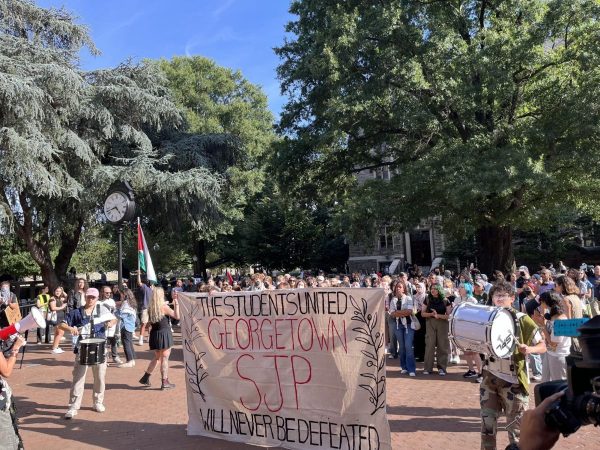Georgetown University students and faculty members defended their right to protest amid concerns about the federal government’s crackdown on campus protests.
Since Feb. 28, President Donald Trump has threatened to pull funds from universities that continue to allow “illegal protests” while his administration announced an antisemitism investigation into 10 schools and later rescinded $400 million in federal grants from Columbia University to combat alleged rampant antisemitism. His administration has also detained students and researchers including Mahmoud Khalil, a former pro-Palestine student protester at Columbia and Badar Khan Suri, a Georgetown postdoctoral researcher from India, citing his criticism of Israel and alleged familial ties to Hamas as grounds for revoking his visa.
Corbin Chance (CAS ’28), the communications director for Georgetown University College Democrats, said he fears students will protest less due to these Trump administration policies.
“The fact that there may not be protests happening, period, is what I’m most concerned about,” Chance told The Hoya. “I don’t know what’s going to happen, but my biggest fear is that it’s just going to completely stifle community engagement and activism.”

Fiona Naughton (SFS ’26), who attended a March 11 walkout against Khalil’s detention, said many demonstrators feared political retribution at the rally she attended.
“There were more people wearing masks than I’ve ever seen before, because there is a huge fear that you’ll be doxxed or that your scholarship will be taken away or that your visa will be revoked,” Naughton told The Hoya.
Student protesters have demonstrated on campuses across the country against Khalil’s detention in recent weeks and broadly in favor of Palestinian liberation since spring 2024.
In April and May 2024, Georgetown students participated in encampments at George Washington University, one of the 10 universities the federal government is now investigating for alleged antisemitism, to protest the Israel-Hamas war. Students did not engage in any similar activity on Georgetown’s campus.
Trump has not clarified what qualifies a protest as “illegal,” but the federal government’s actions have thus focused on pro-Palestinian student protesters, and Trump wrote in a March 10 Truth Social post that Khalil’s arrest was the beginning of his administration’s efforts to retaliate against student protesters.
Nader Hashemi, director of the Alwaleed Center for Muslim-Christian Understanding (ACMCU), which seeks to foster interreligious dialogue, said international students who have previously participated in protests have now expressed concern to him about retaliation, especially after Khalil and Khan Suri’s detainments.
“They’re very worried about what happened to Mahmoud Khalil happening to them,” Hashemi told The Hoya. “Now when you go into the public sphere, I suspect that those students who are not U.S. citizens, probably some of them are playing it safe and not showing up in the way they did last year.”
Hashemi said denying students the right to protest for fear of political retaliation would prompt tension and resentment on campus — particularly against the university administration.
“It would create a more suffocating atmosphere,” Hashemi said. “It would put the university administration in the bullseye, in the crosshairs of criticism and attack.”
A university spokesperson said Georgetown’s speech and expression policy protects campus speech but the university reserves the right to regulate the “time, place and manner” of expression to ensure it does not disrupt university activities, a recognized element of First Amendment law.
“Georgetown is committed to ensuring that all members of our community have a safe and welcoming place to learn and receive the support they need to do so,” the spokesperson wrote to The Hoya. “While members of our community exercise freedom of speech, we work towards a living learning community that is free of bias and geared toward thoughtful, respectful dialogue.”
Mark Lance, professor emeritus and founding director of the justice and peace studies program, said the Trump administration’s actions mean the university has to support student protesters even more than before, referencing Georgetown’s Jesuit values.
“If we’re serious about this idea of cura personalis, of caring for the whole person, part of it is showing a recognition when people’s basic human rights are being denied to them and showing that that matters to us,” Lance said. “If we don’t, then that’s all bullshit lip service.”
The spokesperson said the university protects expression regardless of the view.
“We respect the rights of members of our community to express their personal views and are committed to maintaining the values of academic freedom and serving as a forum for the free exchange of ideas, even when those ideas may be controversial and objectionable to some,” the spokesperson wrote.
Hashemi, who attended the March 11 walkout in support of Khalil, said he hopes similar protests continue and expand despite the Trump administration’s threats.
“I’m hoping this creates a spark to reignite the Gaza encampment movement, although the risks right now are much greater under Trump — they’ll just send in the troops and break it up and hit people with a lot of violence,” Hashemi said. “Those types of social mobilizations are very important in terms of pushing back against repressive policies.”
Naughton said the Trump administration’s actions have made protesting more dangerous for international students and students who rely on university scholarships.
“The onus now falls on everyone who’s in a position of privilege to have an even louder voice than ever before, because if you are not on financial aid, if you are not on a visa, you are in such a position of privilege to be able to continue acting out without fear of oppression,” Naughton said.
“The way that Trump’s administration will succeed is by silencing people, and now, more than ever before, people have to speak up,” Naughton added.